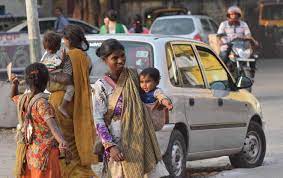By: Javid Amin
Beggary has emerged as a significant issue in Srinagar, the capital city of Jammu and Kashmir, India. A 2019 survey conducted by the Jammu and Kashmir government reported that Srinagar is home to over 10,000 beggars, with approximately 70% originating from outside the state.
Beggary is an intricate problem that defies simple solutions. Several factors contribute to the prevalence of begging, including poverty, unemployment, lack of education, and disabilities. Frequently, beggars hail from impoverished and marginalized communities, often left with no alternative means of sustenance.
Beggars in Srinagar employ various strategies to solicit sympathy and alms. Some feign disability or illness, while others employ their children to beg on their behalf. Regrettably, a few beggars resort to aggressive or abusive behavior.
The presence of beggars in public spaces not only poses a nuisance but also a safety hazard. Beggars often pester individuals for money and may be involved in criminal activities.
Impacts of Begging on Srinagar
The practice of begging in Srinagar carries multiple detrimental consequences. It can generate feelings of fear and insecurity among the general populace, tarnishing the city’s image as a tourist destination. Moreover, begging may contribute to increased criminality and social unrest.
Furthermore, begging takes its toll on the beggars themselves. They are often trapped in a cycle of poverty, living in squalid conditions, and exposed to violence and abuse. This vulnerable population is also at risk of developing mental health issues.
Addressing the Begging Issue in Srinagar
Resolving the problem of begging in Srinagar is a challenging endeavor with no simple answers. Nevertheless, there are several avenues through which the issue can be tackled:
- Education and Employment Opportunities: Providing access to education and job opportunities for beggars can significantly reduce the number of individuals compelled to beg for their livelihood.
- Social Security Benefits: Offering social security benefits to beggars can ensure they have a basic standard of living, reducing their dependence on begging.
- Raising Awareness: Increasing public awareness about the issue of begging and encouraging donations to charities working to assist beggars can provide vital support.
- Counteracting Organized Begging: Taking decisive action against criminal networks involved in organized begging can help curtail this practice.
It’s important to recognize that addressing begging is a multifaceted challenge that demands coordinated efforts from the government, civil society, and the public for effective resolution.
Dealing with Beggars from Outside the State
The prevalence of beggars from outside Jammu and Kashmir presents a considerable challenge. While the government has initiated measures like deporting beggars from other states, more must be done to prevent their entry into the state initially. This could involve:
- Coordinated Approach: Collaborating with other states to create a unified strategy for tackling the issue of begging.
- Border Security: Strengthening border security measures to prevent beggars from entering the state illegally.
- Public Awareness: Educating the public about the risks associated with giving alms to beggars from outside the state.
Through these measures, the Jammu and Kashmir government can work toward reducing the number of beggars in Srinagar and fostering a more hospitable city for all its residents.
In Summation: Beggary is a multifaceted issue necessitating holistic solutions. Addressing its root causes, offering support to beggars, and combatting criminal networks involved in organized begging are all crucial aspects of resolving this challenging problem.






